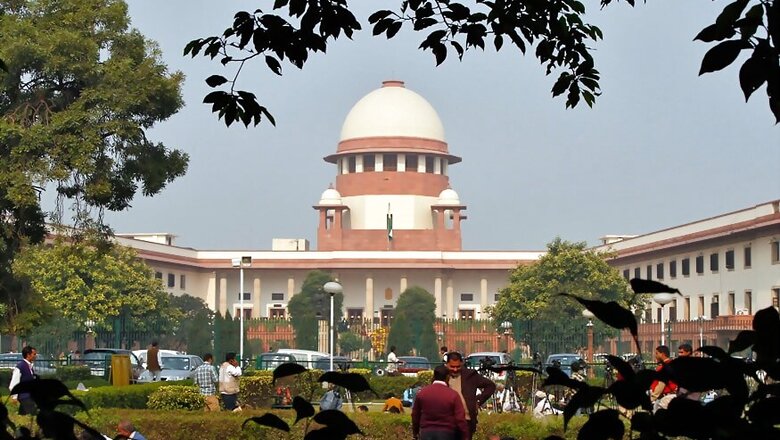
views
New Delhi: The Supreme Court on Friday underscored that despite expectations by the Constitution framers and nudges by the top court, the Uniform Civil Code (UCC) has remained elusive for Indian citizens.
A bench comprising Justices Deepak Gupta and Aniruddha Bose rued that although a positive test on the UCC was included in Article 44 of the Constitution, no efforts seem to have been made to transform it into reality.
"It is interesting to note that whereas the founders of the Constitution in Article 44 in Part IV dealing with the Directive Principles of State Policy had hoped and expected that the State shall endeavour to secure for the citizens a Uniform Civil Code throughout the territories of India, till date no action has been taken in this regard," the bench highlighted.
It noted that even after Hindu laws were codified in 1956, "there has been no attempt to frame a Uniform Civil Code applicable to all citizens of the country despite exhortations of this court in the case of Mohd Ahmed Khan vs Shah Bano and Sarla Mudgal and Others vs Union of India and Others".
While the famous Shah Bano case on maintenance rights of Muslim women was decided by the top court in 1982, the Sarla Mudgal verdict in 1995 talked about uniformity in laws for all the citizens. The Sarla Mudgal case, which deals with issue of bigamy and conflict between the personal laws existing on matters of marriage, is considered as a landmark verdict highlighting the need for a UCC.
The bench was deciding a legal issue as to whether succession to a property of a Goan living outside Goa will be subject to Portuguese laws or the Succession Act. Since Goa was earlier a Portuguese colony, the country's laws used to apply there.
The top court dealt with the question as to whether the Portuguese Civil Code can be said to be a foreign law and the principles of private international law are applicable. It said that these laws would not have been applicable unless recognised by the Indian government and the Portuguese Civil Code continued to apply in Goa only because of an Act of the Parliament of India.
"Therefore, the Portuguese law which may have had foreign origin became a part of the Indian laws, and, in sum and substance, is an Indian law. It is no longer a foreign law. Goa is a territory of India; all domiciles of Goa are citizens of India; the Portuguese Civil Code is applicable only on account of the Ordinance and the Act referred to above," the bench said.
The bench cited Goa as a "shining example" where the UCC was in vogue irrespective of the religion of its citizens. It narrated how the concept of joint matrimonial property ensured equal division in cases of divorce.
"Muslim men whose marriages are registered in Goa cannot practice polygamy. Further, even for followers of Islam there is no provision for verbal divorce," it noted.
The bench, deciding the point of law, ruled that not the Succession Act but the Portuguese Civil Code of 1867 will govern the rights of succession and inheritance even in respect of properties of a Goan domicile situated outside the state, anywhere in India.
The bench relied upon a previous judgment by the Supreme Court, which had held that the Succession Act will not impact the succession and inheritance rights if there is a special law dealing with the rights of a specific class of people — Goan domiciles in the present case.
The simmering debate over the UCC hit the headlines in 1985 after the Supreme Court had awarded maintenance to 60-year-old divorcee Shah Bano.
On July 23, 2003, an apex court bench led by the then Chief Justice of India VN Khare had said that Article 44 was based on the premise that there was no necessary connection between religious and personal law in a civilised society.
On October 12, 2015, while dealing with a divorce case under the Christian Divorce Act, a Supreme Court bench headed by the then Justice Vikramajit Sen had asked the government to take a quick decision on the UCC to end the confusion over personal community laws.
(With inputs from PTI)
















Comments
0 comment